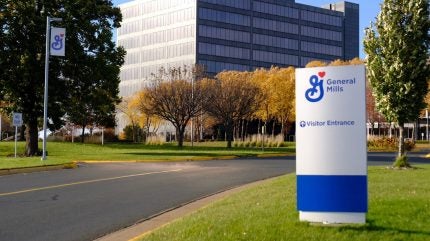
US group General Mills is eyeing a sizeable acquisition as it prepares to leave the yogurt category.
Chairman and CEO Jeff Harmening said he is positioned to release $1-2bn from General Mills’ pocket book in pursuit of “options to strengthen our growth profile”.

Discover B2B Marketing That Performs
Combine business intelligence and editorial excellence to reach engaged professionals across 36 leading media platforms.
Reporting the company’s first-quarter results, Harmening added the size of the potential M&A would be similar to what the US company paid for US food manufacturer Annie’s and Tyson Foods’ pet-treats businesses in 2014 and 2021, respectively, but not in the echelon of the deal for Blue Buffalo in 2018.
The former two deals went through for less than the bolt-on M&A now proposed, to the tune of $820m and $1.2bn, but much less than the $8bn forked out for Blue Buffalo. The sale of the North American yogurt business to Lactalis and Sodiaal –announced last week – is set to raise $2.1bn.
Harmening said General Mills “didn’t find any acquisition candidates that we really liked” last year – fiscal 2024 – so instead the business returned cash to shareholders. This year looks different, however, as he indicated the company is capable of repeating shareholder payments, as well as instigating M&A.
“When it comes to this year, our balance sheet is in a great place,” Harmening responded to the inevitable questioning on M&A during today’s Q&A call session.

US Tariffs are shifting - will you react or anticipate?
Don’t let policy changes catch you off guard. Stay proactive with real-time data and expert analysis.
By GlobalData“With this divestiture of our North American yogurt businesses, we felt it important to make sure that all of our investors know what we intend to do with those proceeds.”
He also emphasised flexibility if the right deal appeared in the investment window.
“Certainly, if something bigger came along that we don’t see now, we could entertain the notion.
“But it seems like our focus right now, on what we see in the marketplace, is probably more availability of smaller-size assets that we could bolt-on that would enhance our growth, but bolted on to businesses we already own,” Harmening explained.
While Harmening was quite precise on what he is willing to pay for a target acquisition this fiscal year, he was reluctant to give too much more away, albeit trying to give analysts some sense of direction.
“It’s going to be things that bolt-on to our existing categories. A category where you have a right to win, which in a large degree are our global businesses.
“So you look at what we’ve done in acquisitions in pet or snacking, or what we’ve done in foodservice, I would expect more of those, both on the priority businesses, where we have a right to win and where we see growth. And it could be international, it could be domestic,” Harmening said.
“Where we have a competitive advantage, where we see growth, maybe get a little synergy along the way, those are the places where we will continue to look.”
Delving into the company’s first-quarter performance, Harmening said General Mills made progress in “improving our competitiveness, reshaping our portfolio, and delivering on our financial goals”.
The numbers for the opening three months of the company’s new fiscal year were “broadly in line with our expectations”, he said.
“As we entered fiscal 2025, we outlined three factors that we expected would impact our operating environment and our ability to deliver on our priorities, including value-seeking behaviours from consumers, continued inflation and a stabilisation of global supply chains,” Harmening added.
“And with three months behind us, we’re broadly seeing the environment evolve as we anticipated.”
Both reported and organic net sales were down 1% at $4.8bn. Group volumes were flat, while price/mix fell one percentage point in organic terms.
Operating profit dropped 11% to $832m and was 4% lower on an adjusted basis at $865m.
Net profit declined 14% to $580m and diluted EPS decreased 10% to $1.03.
Guidance for the full year was kept unchanged – organic sales growth of flat to up 1% and adjusted operating profit flat to down 2%.
“We have more work to do to achieve our goals, and we expect to drive further improvement in our competitiveness and our top- and bottom-line growth for the remainder of the year,” Harmening said in his prepared comments.
He added during the Q&A: “I think the theme of the day is probably progress, and continued work to do, which we intend to do to improve our competitiveness throughout the year.
“My belief is that we’ll keep getting better as the year progresses, starting in Q2 with our competitiveness. And that’s what I would expect given the first quarter played out as we thought.”




